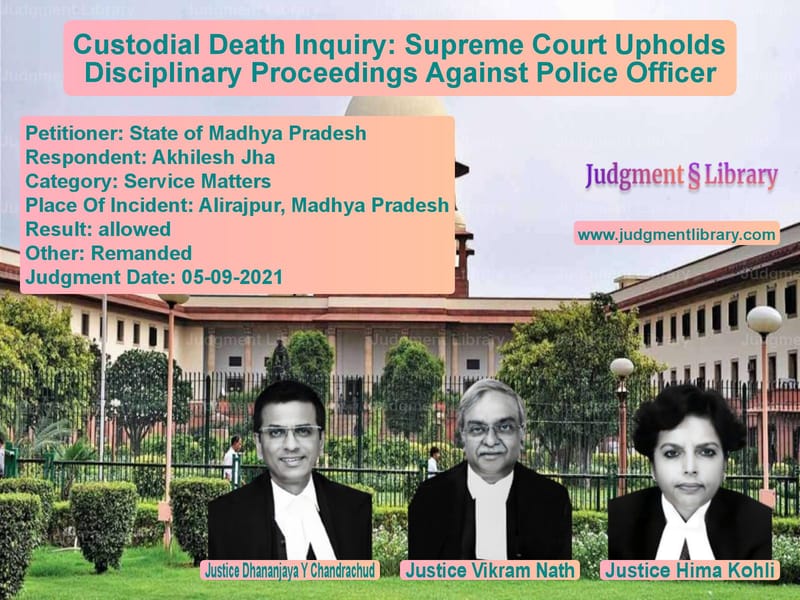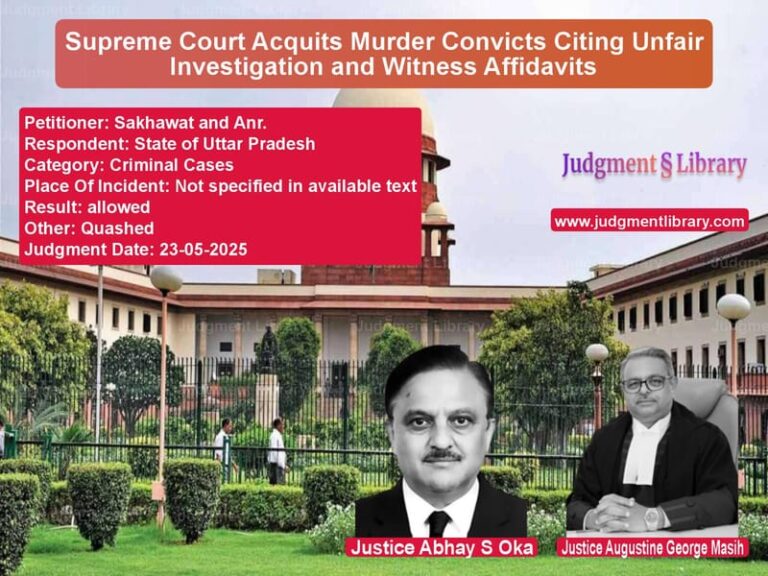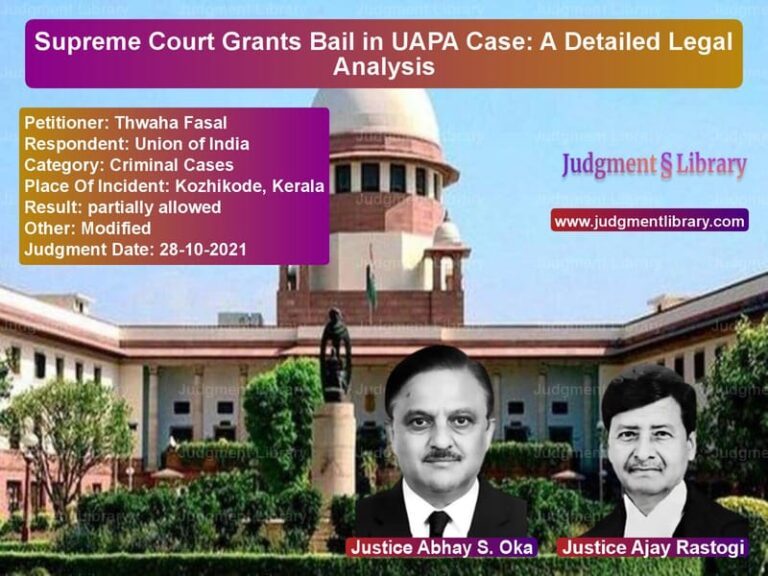Custodial Death Inquiry: Supreme Court Upholds Disciplinary Proceedings Against Police Officer
The case of State of Madhya Pradesh & Anr. v. Akhilesh Jha & Anr. revolves around a police officer’s alleged misconduct related to the unlawful constitution of a squad and the resulting custodial death of a suspect. The Supreme Court had to determine whether the disciplinary proceedings against the officer should continue, despite delays and previous tribunal rulings.
Background of the Case
The dispute arose when Akhilesh Jha, the respondent, was accused of unlawfully forming and operating a “Gunda Squad” while serving as Superintendent of Police in Alirajpur, Madhya Pradesh, from June 2012 to June 2015. Despite instructions from the Inspector General of Police to disband such squads, Jha allegedly continued to supervise and operate it.
On June 1, 2014, a suspect was allegedly interrogated under the squad’s supervision and died in police custody on June 3, 2014. Following the incident:
- A magisterial inquiry was conducted, and a report was submitted on October 10, 2014, which contained serious observations against Jha.
- The officer challenged the magisterial report in the Madhya Pradesh High Court, which expunged some of the observations but allowed disciplinary action with due process.
- On June 8, 2016, a departmental charge-sheet was issued against Jha for insubordination and indiscipline.
- Jha challenged the charge-sheet before the Central Administrative Tribunal (CAT), Jabalpur, which initially refused to interfere.
- In 2017, Jha again approached the CAT, arguing that the prolonged inquiry was affecting his promotional and deputation opportunities.
- The CAT ruled in his favor on January 5, 2018, quashing the charge-sheet based on the delay and ambiguity of charges.
- The Madhya Pradesh government challenged this ruling in the High Court, which upheld the CAT’s decision.
- The state then appealed to the Supreme Court.
Key Legal Issues
The Supreme Court was called upon to answer the following questions:
- Was the charge-sheet against Jha legally valid?
- Did the delay in the inquiry warrant the quashing of disciplinary proceedings?
- Did the findings of the magisterial report justify the continuation of proceedings?
Petitioner’s Arguments (State of Madhya Pradesh)
The Madhya Pradesh government, represented by Deputy Advocate General Ankita Chaudhary, argued:
- The charge-sheet was legally sound and contained specific allegations related to Jha’s role in violating administrative orders.
- The CAT and High Court erred in quashing the proceedings merely due to a delay of two years.
- The disciplinary authority had every right to proceed against Jha, as the allegations were serious and linked to a custodial death.
Respondent’s Arguments (Akhilesh Jha)
Jha, represented by Braj K. Mishra, countered:
- The charge-sheet lacked specific dates and details regarding the alleged violations.
- The disciplinary inquiry had caused him career setbacks by preventing his deputation and promotions.
- The High Court had already expunged certain findings from the magisterial report, weakening the case against him.
Supreme Court’s Observations
After hearing the arguments, the Supreme Court made the following key observations:
- The charge-sheet was not vague; it included a detailed statement of charges, witness lists, and supporting documents.
- “The charge-sheet, together with the statement of imputations, contains a detailed elaboration of the allegations against the first respondent and does not leave the recipient in a measure of doubt.”
- Every delay in conducting a disciplinary inquiry does not automatically make the proceedings invalid.
- “Prejudice must be demonstrated to have been caused and cannot be a matter of surmise. The mere fact that Jha was unable to proceed on deputation or secure promotion is not enough to quash an inquiry.”
- The tribunal and High Court should have directed the expeditious conclusion of the inquiry instead of quashing it entirely.
Supreme Court’s Judgment
The Supreme Court ruled in favor of the State of Madhya Pradesh, holding that:
- The High Court’s judgment quashing the charge-sheet was incorrect and was set aside.
- The disciplinary inquiry against Jha should be completed by July 31, 2022.
- Any pending retirement benefits for Jha should be processed in accordance with the law.
Key Takeaways from the Judgment
- Disciplinary Proceedings Must Follow Due Process: Courts should not quash charge-sheets merely because of delays unless real prejudice is proven.
- Charge-Sheets Should Be Detailed: A charge-sheet should specify allegations clearly to ensure the accused understands the case.
- Custodial Death Cases Require Accountability: The ruling reinforces that officers involved in incidents leading to custodial deaths must be held accountable.
- Expedited Inquiries Should Be Encouraged: Instead of dismissing charges, courts should direct authorities to complete inquiries within a set timeline.
- Magisterial Reports Hold Weight: Even if certain findings are expunged, magisterial inquiries can still be grounds for disciplinary proceedings.
Conclusion
The Supreme Court’s ruling in State of Madhya Pradesh v. Akhilesh Jha reaffirms the importance of allowing disciplinary authorities to complete their proceedings. The judgment ensures that police misconduct cases are not dismissed due to procedural delays and emphasizes the role of magisterial inquiries in maintaining police accountability. By setting a deadline for the inquiry’s completion, the Court balanced the need for justice with the accused officer’s right to a timely decision.
Petitioner Name: State of Madhya Pradesh.Respondent Name: Akhilesh Jha.Judgment By: Justice Dhananjaya Y Chandrachud, Justice Vikram Nath, Justice Hima Kohli.Place Of Incident: Alirajpur, Madhya Pradesh.Judgment Date: 05-09-2021.
Don’t miss out on the full details! Download the complete judgment in PDF format below and gain valuable insights instantly!
Download Judgment: state-of-madhya-prad-vs-akhilesh-jha-supreme-court-of-india-judgment-dated-05-09-2021.pdf
Directly Download Judgment: Directly download this Judgment
See all petitions in Disciplinary Proceedings
See all petitions in Public Sector Employees
See all petitions in Employment Disputes
See all petitions in Judgment by Dhananjaya Y Chandrachud
See all petitions in Judgment by Vikram Nath
See all petitions in Judgment by Hima Kohli
See all petitions in allowed
See all petitions in Remanded
See all petitions in supreme court of India judgments September 2021
See all petitions in 2021 judgments
See all posts in Service Matters Category
See all allowed petitions in Service Matters Category
See all Dismissed petitions in Service Matters Category
See all partially allowed petitions in Service Matters Category







